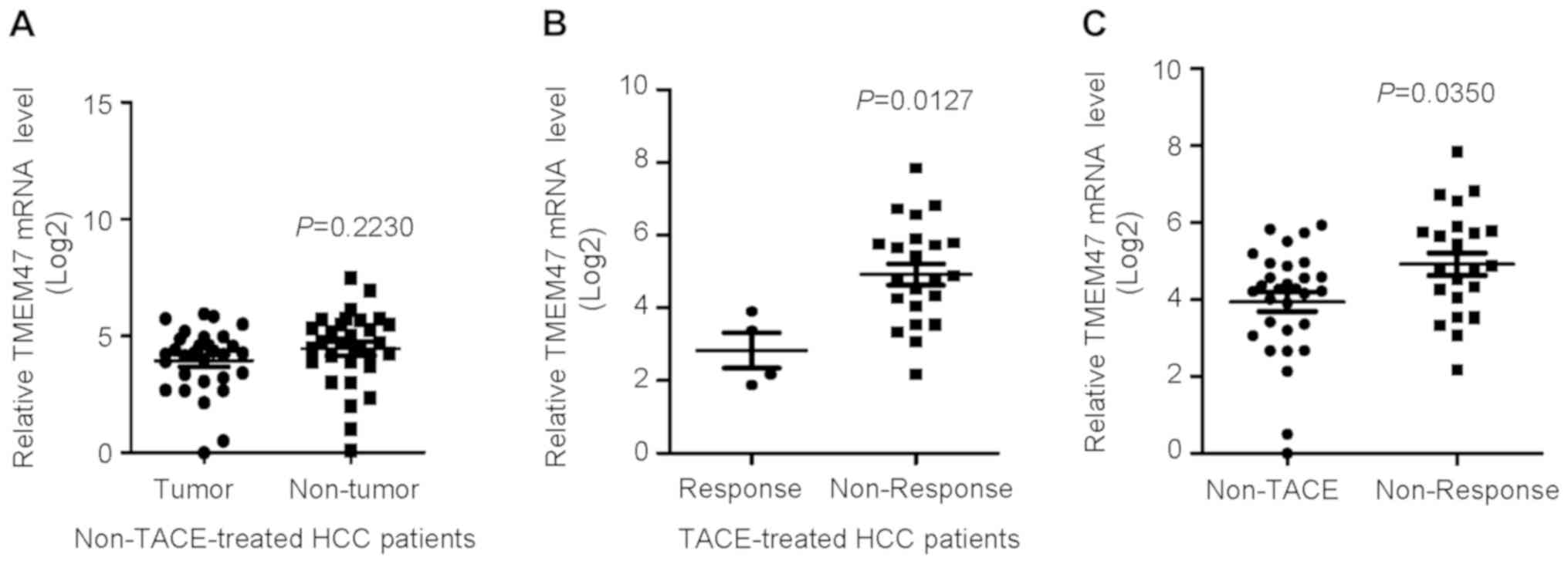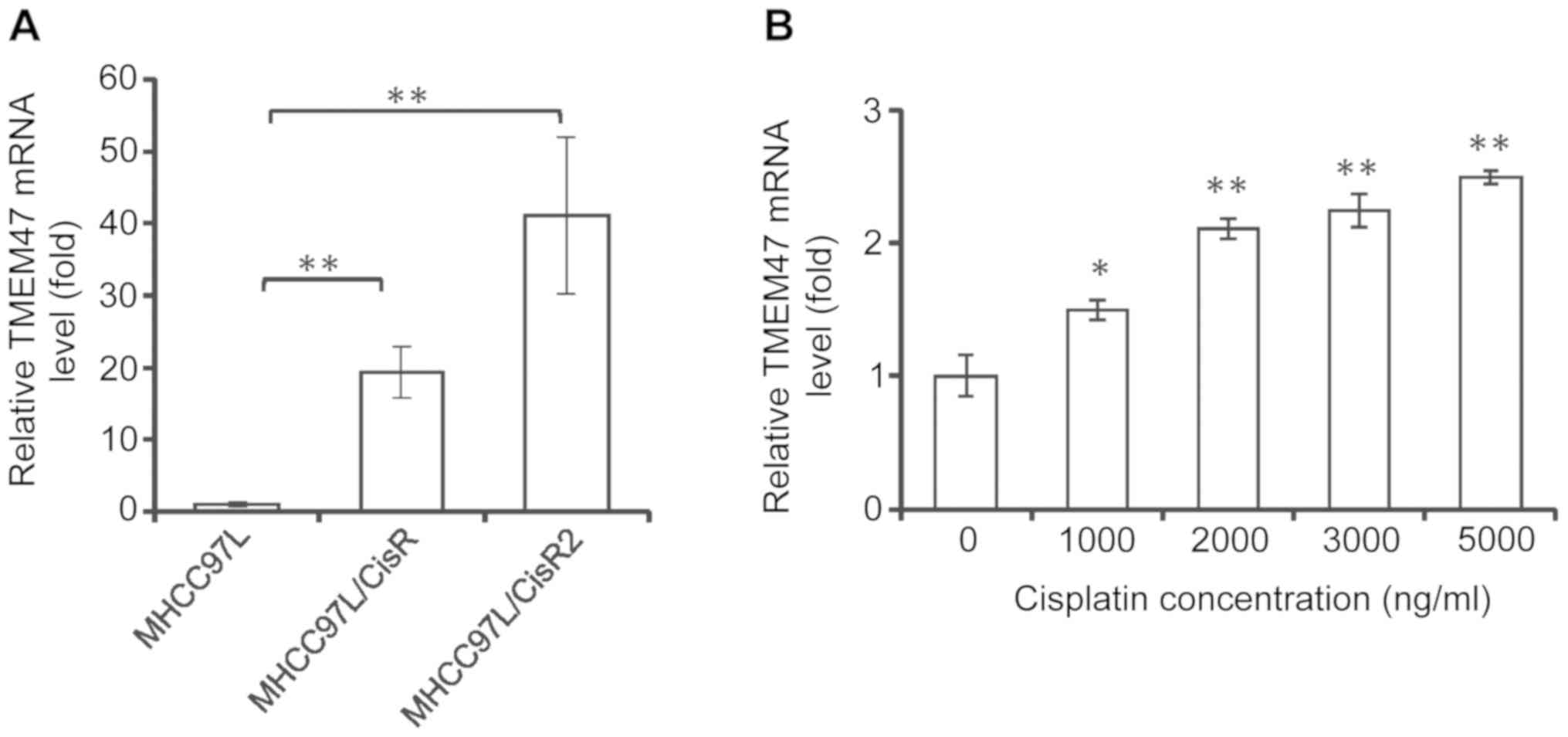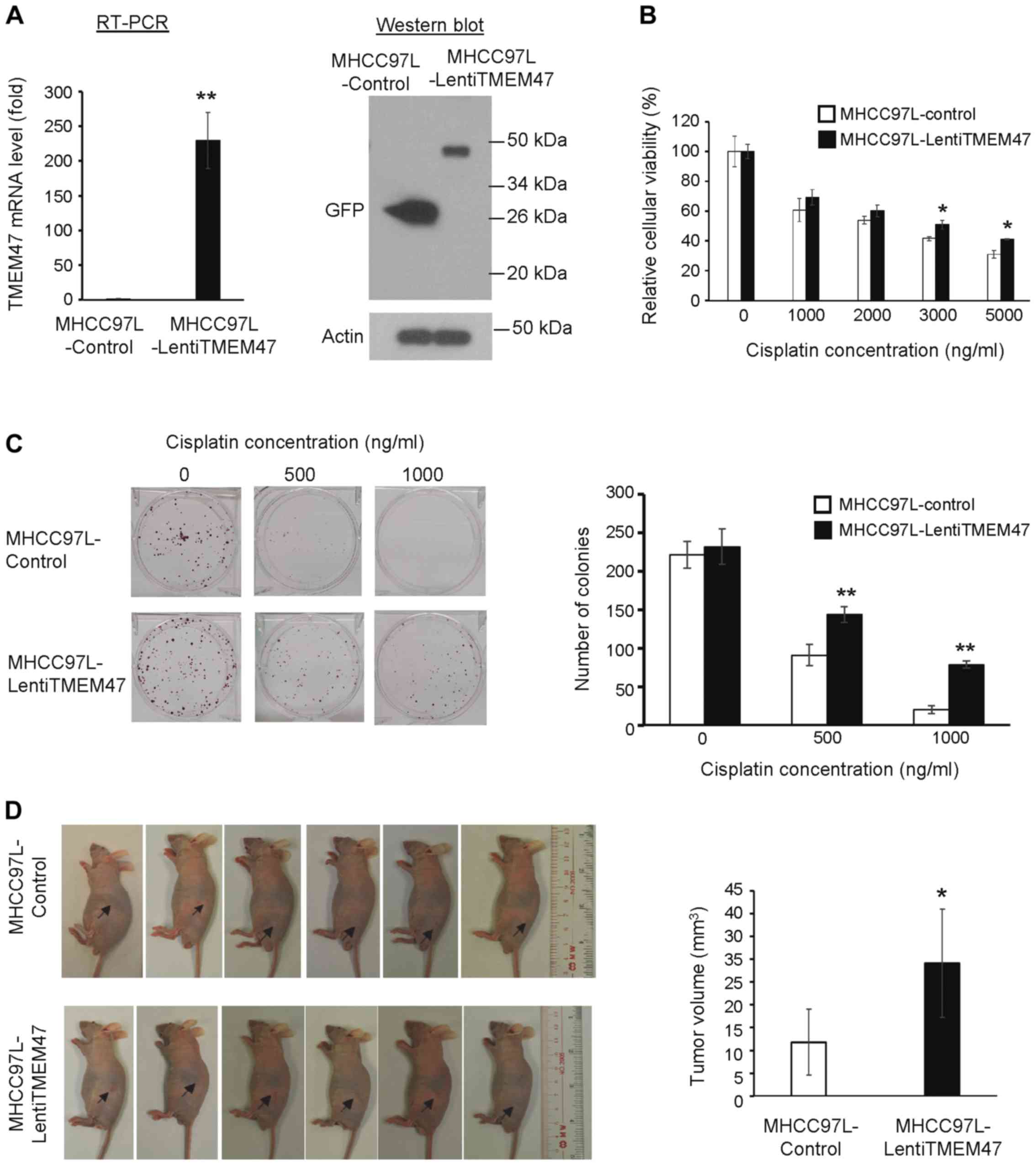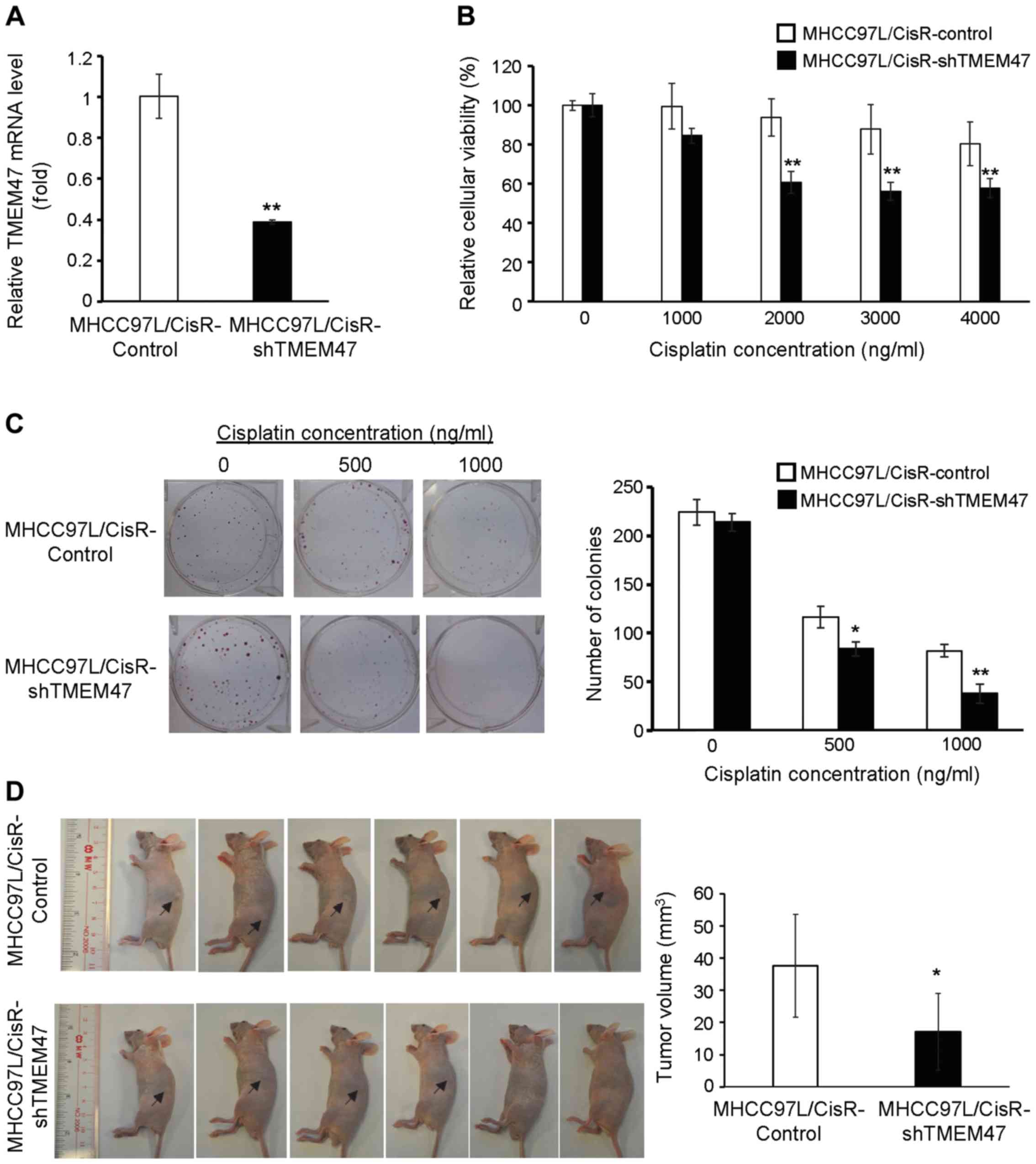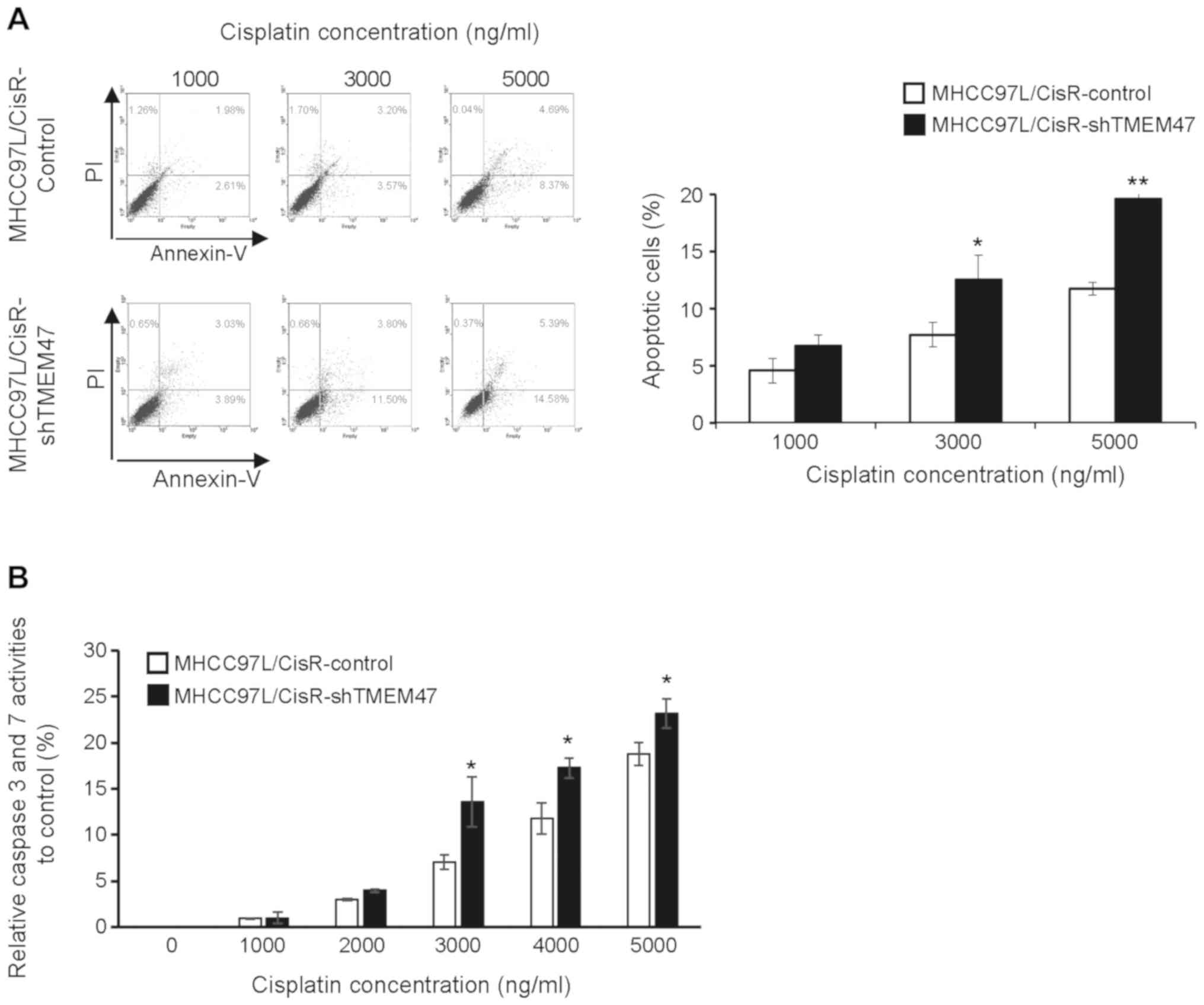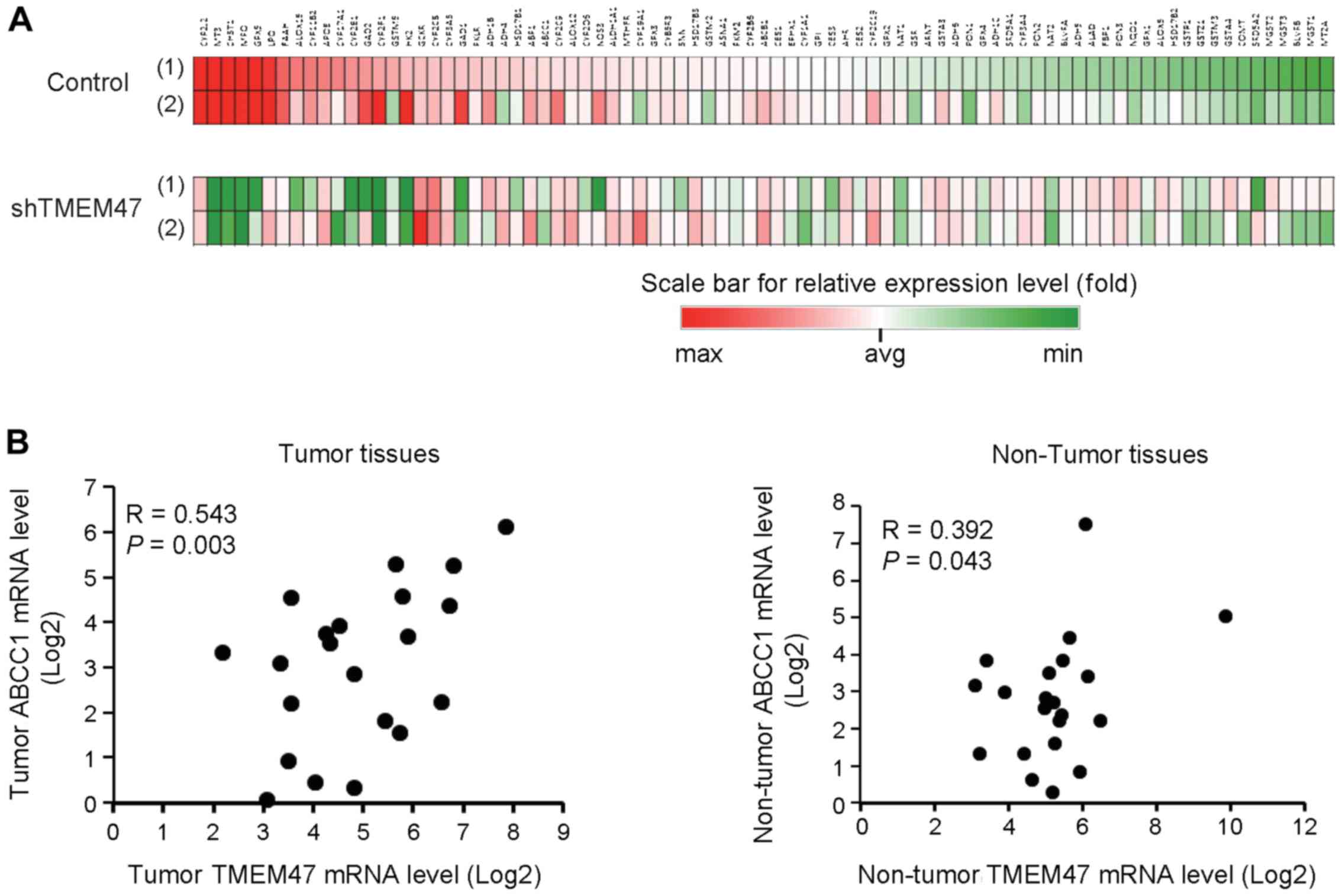|
1
|
Villanueva A: Hepatocellular carcinoma. N
Engl J Med. 380:1450–1462. 2019. View Article : Google Scholar : PubMed/NCBI
|
|
2
|
Zhu AX: Systemic therapy of advanced
hepatocellular carcinoma: How hopeful should we be? Oncologist.
11:790–800. 2006. View Article : Google Scholar : PubMed/NCBI
|
|
3
|
Worns MA, Weinmann A, Schuchmann M and
Galle PR: Systemic therapies in hepatocellular carcinoma. Dig Dis.
27:175–188. 2009. View Article : Google Scholar : PubMed/NCBI
|
|
4
|
Lohitesh K, Chowdhury R and Mukherjee S:
Resistance a major hindrance to chemotherapy in hepatocellular
carcinoma: An insight. Cancer Cell Int. 18:442018. View Article : Google Scholar : PubMed/NCBI
|
|
5
|
Llovet JM, Ricci S, Mazzaferro V, Hilgard
P, Gane E, Blanc JF, de Oliveira AC, Santoro A, Raoul JL, Forner A,
et al: Sorafenib in advanced hepatocellular carcinoma. N Engl J
Med. 359:378–390. 2008. View Article : Google Scholar : PubMed/NCBI
|
|
6
|
Kudo M, Finn RS, Qin S, Han KH, Ikeda K,
Piscaglia F, Baron A, Park JW, Han G, Jassem J, et al: Lenvatinib
versus sorafenib in first-line treatment of patients with
unresectable hepatocellular carcinoma: A randomised phase 3
non-inferiority trial. Lancet. 391:1163–1173. 2018. View Article : Google Scholar : PubMed/NCBI
|
|
7
|
da Motta Girardi D, Correa TS, Crosara
Teixeira M and Dos Santos Fernandes G: Hepatocellular carcinoma:
Review of targeted and immune therapies. J Gastrointest Cancer.
49:227–236. 2018. View Article : Google Scholar : PubMed/NCBI
|
|
8
|
Faivre S, Rimassa L and Finn RS: Molecular
therapies for HCC: Looking outside the box. J Hepatol. 72:342–352.
2020. View Article : Google Scholar : PubMed/NCBI
|
|
9
|
Dasari S and Tchounwou PB: Cisplatin in
cancer therapy: Molecular mechanisms of action. Eur J Pharmacol.
740:364–378. 2014. View Article : Google Scholar : PubMed/NCBI
|
|
10
|
Ikeda K: Recent advances in medical
management of hepatocellular carcinoma. Hepatol Res. 49:14–32.
2019. View Article : Google Scholar
|
|
11
|
Galluzzi L, Senovilla L, Vitale I, Michels
J, Martins I, Kepp O, Castedo M and Kroemer G: Molecular mechanisms
of cisplatin resistance. Oncogene. 31:1869–1883. 2012. View Article : Google Scholar
|
|
12
|
Koberle B, Tomicic MT, Usanova S and Kaina
B: Cisplatin resistance: Preclinical findings and clinical
implications. Biochim Biophys Acta. 1806:172–182. 2010.PubMed/NCBI
|
|
13
|
Makovec T: Cisplatin and beyond: Molecular
mechanisms of action and drug resistance development in cancer
chemotherapy. Radiol Oncol. 53:148–158. 2019. View Article : Google Scholar : PubMed/NCBI
|
|
14
|
Pratama MY, Pascut D, Massi MN and
Tiribelli C: The role of microRNA in the resistance to treatment of
hepatocellular carcinoma. Ann Transl Med. 7:5772019. View Article : Google Scholar : PubMed/NCBI
|
|
15
|
Llovet JM and Bruix J: Systematic review
of randomized trials for unresectable hepatocellular carcinoma:
Chemoembolization improves survival. Hepatology. 37:429–442. 2003.
View Article : Google Scholar : PubMed/NCBI
|
|
16
|
Raoul JL, Forner A, Bolondi L, Cheung TT,
Kloeckner R and de Baere T: Updated use of TACE for hepatocellular
carcinoma treatment: How and when to use it based on clinical
evidence. Cancer Treat Rev. 72:28–36. 2019. View Article : Google Scholar
|
|
17
|
Llovet JM, Real MI, Montaña X, Planas R,
Coll S, Aponte J, Ayuso C, Sala M, Muchart J, Solá R, et al:
Arterial embolisation or chemoembolisation versus symptomatic
treatment in patients with unresectable hepatocellular carcinoma: A
randomised controlled trial. Lancet. 359:1734–1739. 2002.
View Article : Google Scholar : PubMed/NCBI
|
|
18
|
Ng KT, Lo CM, Guo DY, Qi X, Li CX, Geng W,
Liu XB, Ling CC, Ma YY, Yeung WH, et al: Identification of
transmembrane protein 98 as a novel chemoresistance-conferring gene
in hepatocellular carcinoma. Mol Cancer Ther. 13:1285–1297. 2014.
View Article : Google Scholar : PubMed/NCBI
|
|
19
|
Dong Y and Simske JS: Vertebrate
Claudin/PMP22/EMP22/MP20 family protein TMEM47 regulates epithelial
cell junction maturation and morphogenesis. Dev Dyn. 245:653–666.
2016. View Article : Google Scholar : PubMed/NCBI
|
|
20
|
Burnett RM, Craven KE, Krishnamurthy P,
Goswami CP, Badve S, Crooks P, Mathews WP, Bhat-Nakshatri P and
Nakshatri H: Organ-specific adaptive signaling pathway activation
in meta-static breast cancer cells. Oncotarget. 6:12682–12696.
2015. View Article : Google Scholar : PubMed/NCBI
|
|
21
|
Cheung IY, Feng Y, Danis K, Shukla N,
Meyers P, Ladanyi M and Cheung NK: Novel markers of subclinical
disease for Ewing family tumors from gene expression profiling.
Clin Cancer Res. 13:6978–6983. 2007. View Article : Google Scholar : PubMed/NCBI
|
|
22
|
Mithani SK, Smith IM and Califano JA: Use
of integrative epigenetic and cytogenetic analyses to identify
novel tumor-suppressor genes in malignant melanoma. Melanoma Res.
21:298–307. 2011. View Article : Google Scholar : PubMed/NCBI
|
|
23
|
Poon RT, Ngan H, Lo CM, Liu CL, Fan ST and
Wong J: Transarterial chemoembolization for inoperable
hepatocellular carcinoma and postresection intrahepatic recurrence.
J Surg Oncol. 73:109–114. 2000. View Article : Google Scholar : PubMed/NCBI
|
|
24
|
Li Y, Tang ZY, Ye SL, Liu YK, Chen J, Xue
Q, Chen J, Gao DM and Bao WH: Establishment of cell clones with
different meta-static potential from the metastatic hepatocellular
carcinoma cell line MHCC97. World J Gastroenterol. 7:630–636. 2001.
View Article : Google Scholar
|
|
25
|
Ng KT, Xu A, Cheng Q, Guo DY, Lim ZX, Sun
CK, Fung JH, Poon RT, Fan ST, Lo CM, et al: Clinical relevance and
therapeutic potential of angiopoietin-like protein 4 in
hepatocel-lular carcinoma. Mol Cancer. 13:1962014. View Article : Google Scholar
|
|
26
|
Ng KT, Qi X, Kong KL, Cheung BY, Lo CM,
Poon RT, Fan ST and Man K: Overexpression of matrix
metalloproteinase-12 (MMP-12) correlates with poor prognosis of
hepatocellular carcinoma. Eur J Cancer. 47:2299–305. 2011.
View Article : Google Scholar : PubMed/NCBI
|
|
27
|
Ng KT, Lee TK, Cheng Q, Wo JY, Sun CK, Guo
DY, Lim ZX, Lo CM, Poon RT, Fan ST, et al: Suppression of
tumorigenesis and metastasis of hepatocellular carcinoma by shRNA
interference targeting on homeoprotein Six1. Int J Cancer.
127:859–872. 2010.
|
|
28
|
Livak KJ and Schmittgen TD: Analysis of
relative gene expression data using real-time quantitative PCR and
the 2(-Delta Delta C(T)) method. Methods. 25:402–408. 2001.
View Article : Google Scholar
|
|
29
|
Liu XY, Liu SP, Jiang J, Zhang X and Zhang
T: Inhibition of the JNK signaling pathway increases sensitivity of
hepatocellular carcinoma cells to cisplatin by down-regulating
expression of P-glycoprotein. Eur Rev Med Pharmacol Sci.
20:1098–1108. 2016.PubMed/NCBI
|
|
30
|
Yau T, Chan P, Epstein R and Poon RT:
Management of advanced hepatocellular carcinoma in the era of
targeted therapy. Liver Int. 29:10–17. 2009. View Article : Google Scholar : PubMed/NCBI
|
|
31
|
Wysocki PJ: Targeted therapy of
hepatocellular cancer. Expert Opin Investig Drugs. 19:265–274.
2010. View Article : Google Scholar : PubMed/NCBI
|
|
32
|
Duan B, Huang C, Bai J, Zhang YL, Wang X,
Yang J and Li J: Multidrug resistance in hepatocellular carcinoma.
Hepatocellular Carcinoma. Tirnitz-Parker JEE: Codon Publications;
Brisbane, AU: 2019, View Article : Google Scholar
|
|
33
|
Forner A, Llovet JM and Bruix J:
Hepatocellular carcinoma. Lancet. 379:1245. 2012. View Article : Google Scholar : PubMed/NCBI
|
|
34
|
Takayasu K, Arii S, Ikai I, Omata M, Okita
K, Ichida T, Matsuyama Y, Nakanuma Y, Kojiro M, Makuuchi M, et al:
Prospective cohort study of transarterial chemoembolization for
unresectable hepatocellular carcinoma in 8510 patients.
Gastroenterology. 131:461–469. 2006. View Article : Google Scholar : PubMed/NCBI
|
|
35
|
Volkmann M, Schiff JH, Hajjar Y, Otto G,
Stilgenbauer F, Fiehn W, Galle PR and Hofmann WJ: Loss of CD95
expression is linked to most but not all p53 mutants in European
hepatocellular carcinoma. J Mol Med (Berl). 79:594–600. 2001.
View Article : Google Scholar
|
|
36
|
Schattenberg JM, Galle PR and Schuchmann
M: Apoptosis in liver disease. Liver Int. 26:904–911. 2006.
View Article : Google Scholar : PubMed/NCBI
|
|
37
|
Chun E and Lee KY: Bcl-2 and Bcl-xL are
important for the induction of paclitaxel resistance in human
hepatocellular carcinoma cells. Biochem Biophys Res Commun.
315:771–779. 2004. View Article : Google Scholar : PubMed/NCBI
|
|
38
|
Chan KT and Lung ML: Mutant p53 expression
enhances drug resistance in a hepatocellular carcinoma cell line.
Cancer Chemother Pharmacol. 53:519–526. 2004. View Article : Google Scholar : PubMed/NCBI
|
|
39
|
Mondal J and Khuda-Bukhsh AR: Cisplatin
and farnesol co-encapsulated PLGA nano-particles demonstrate
enhanced anti-cancer potential against hepatocellular carcinoma
cells in vitro. Mol Biol Rep. 47:3615–3628. 2020. View Article : Google Scholar : PubMed/NCBI
|
|
40
|
Cassim S, Raymond VA, Dehbidi-Assadzadeh
L, Lapierre P and Bilodeau M: Metabolic reprogramming enables
hepatocarcinoma cells to efficiently adapt and survive to a
nutrient-restricted microenvironment. Cell Cycle. 17:903–916. 2018.
View Article : Google Scholar : PubMed/NCBI
|















